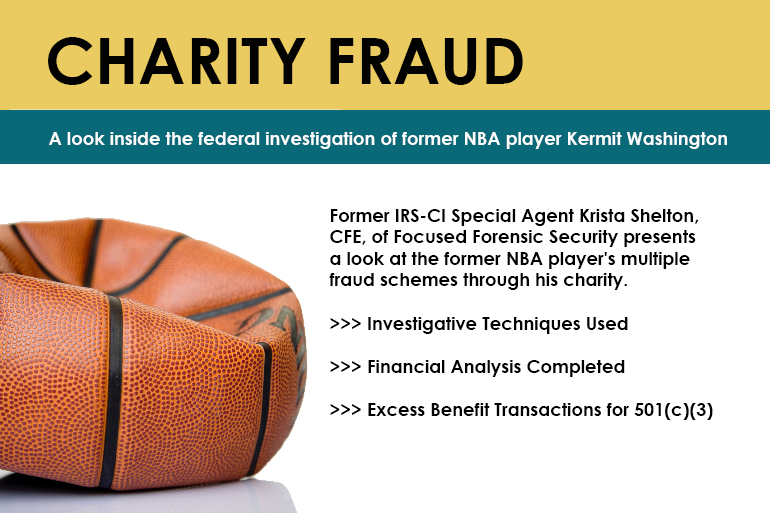homepage | Charity Fraud: Five Questions With Forensic Accounting Expert Krista Shelton
June 29, 2022
June 29, 2022

Both nonprofit organizations and for-profit businesses are susceptible to embezzlement, tax fraud, and other illegal financial activity. Forensic accounting is a formidable tool to audit and verify the accuracy of financial records. Charity Fraud: A Look Inside the Federal Investigation of Former NBA Player Kermit Washington sheds light on how forensic accounting uncovered fraudulence.
Focused Forensic Solutions president Krista Shelton and former Special Agent with the Internal Revenue Service, Criminal Investigation, presents Charity Fraud on August 23, 12-1 pm (Reserve seating). The presentation explores investigative techniques, financial analysis, and excess benefit transactions for 501(c((3) relevant to the case. A catered lunch is included with registration. One credit of Continuing Legal Education is available for this session.
“I’m excited to present the case against Kermit Washington,” Shelton says. “I think the audience will not only be entertained by the many twists and turns, but also walk away with a better understanding of what a forensic accountant does. More importantly, when and how a forensic accountant can provide assistance to you.”
Shelton, an expert in forensic accounting and fraud investigation, shares insight below into the former NBA player’s case and her extensive work in the field.
Please describe the function of forensic accounting.
Forensic accounting is a specialized area of accounting that involves collecting and analyzing financial records, such as business records, bank statements, and tax returns to verify the accuracy of a financial situation. Forensic accountants look for all the relevant information, conduct the necessary analysis, and provide clients with a report that is easy to understand. Typical cases include internal fraud investigations like embezzlement, litigation support including expert witness testimony, and divorce proceedings. Forensic accountants can also often assist individuals with matters before the Internal Revenue Service (IRS), including audit, collection, and criminal investigation activities.
How long did you work on the Kermit Washington investigation?
The investigation began as part of a larger counterfeit software case being worked by the United States Attorney’s Office and Homeland Security Investigations (HSI). IRS, Criminal Investigation (IRS-CI), officially joined the team in December 2015 to investigate Washington for potential financial crimes, including embezzlement and tax fraud. Washington was indicted by a federal grand jury six months later.
However, most IRS-CI cases take an average of two to three years due to several factors. The amount of financial data that is collected and analyzed in these often-complex financial crimes can be quite voluminous. Evidence also typically comes from many different domestic and international sources. In addition, all tax-related charges recommended by IRS-CI go through multiple extensive internal reviews and must ultimately be approved by the Department of Justice-Tax Division before they can be prosecuted.
How did the IRS learn about this particular fraud?
Special agents generate criminal tax cases from many different sources, including referrals from other IRS divisions and law enforcement agencies, confidential informants, financial institutions, and whistleblowers. In this instance, Washington was being investigated by HSI for his participation in a counterfeit software conspiracy that involved the use of a charitable organization. Once the investigative team determined Washington was potentially committing financial crimes, they reached out to IRS-CI for assistance. IRS-CI agents are the only federal law enforcement officers with jurisdiction to investigate tax crimes.
What drew you to work in forensic accounting and investigation?
I started working as a Revenue Agent in the Small Business/Self-Employed Division of the IRS after graduating college. My primary responsibility was auditing individual and small business taxpayers. This provided my first real experience in forensic accounting. What I really enjoyed about this position was that every examination was different. Every case was a different type of business or industry. Every audit involved a different set of compliance issues. It was challenging in a good way.
I got my first taste of law enforcement after discovering fraud during in an audit of a roofing company. I referred the case to IRS-CI and was given the opportunity to work on the case side-by-side with a special agent. I assisted the agent with witness interviews, reviewing records, and calculating criminal tax losses.
Will you offer suggestions to leaders of businesses and non-profits on how to watch for embezzlement and fraud within an organization?
The Charity Fraud Presentation will take you through the bizarre and interesting investigation of Kermit Washington. It also provides learning opportunities that any individual or organization can benefit from.
In addition, I’ve developed a separate training course, Fraud Red Flags for Business Owners, soon to be offered through UMKC TalentLink. This course provides more in-depth training that focuses on the following objectives:
According, to the Association of Certified Fraud Examiners (ACFE), a typical fraud case causes a loss of $8,300 per month and lasts 12 months before detection. The goal of this course is to provide practical guidance to small business owners to help mitigate their risk of fraud.

Join former IRS-CI Special Agent, Krista Shelton as she explains the techniques and analysis used to uncover the former NBA player’s fraudulence. A catered lunch is included with registration. One credit of Continuing Legal Education is available for this session.
Krista Shelton, CFE is the President of Focused Forensic Solutions, LLC, a forensic accounting and fraud investigation firm. FFS specializes in organizing and analyzing complex financial and other relevant data and providing results in accurate and timely summaries and reports.
Prior to forming FFS, Krista Shelton served as a Special Agent with the Internal Revenue Service, Criminal Investigation for nearly 10 years, where she investigated potential violations of the Internal Revenue Code and related financial crimes, including money laundering and violations of the Bank Secrecy Act.
As a Special Agent, Krista examined and analyzed vast amounts of complex financial data from diverse domestic and international sources. She has conducted numerous witness and subject interviews and participated in surveillance, undercover operations, execution of warrants, searches for physical and digital evidence, and seizures of contraband and assets obtained from illicit activities. Her roles also included preparing workpapers and reports to document evidence and identify applicable laws. Krista made prosecution recommendations to the United States Attorney’s Office and to the Department of Justice—Tax Division, assisted in preparing cases for trial, and testified as a government witness.
